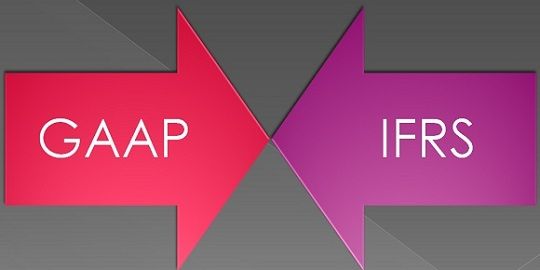 IFRS Vs GAAP is the most debatable topic in accounting where the former is defined as the financial reporting method having universal applicability while the latter are the set of guidelines made for financial accounting. Since past few years, IFRS has gained significant importance, due to which over hundred countries of the world have adopted IFRS as the standard for accounting. The issuing organizations of the two are continuously working on their convergence.
IFRS Vs GAAP is the most debatable topic in accounting where the former is defined as the financial reporting method having universal applicability while the latter are the set of guidelines made for financial accounting. Since past few years, IFRS has gained significant importance, due to which over hundred countries of the world have adopted IFRS as the standard for accounting. The issuing organizations of the two are continuously working on their convergence.
IFRS or otherwise known as International Financial Reporting Standard implies a principle-based set of standards. On the other hand Generally Accepted Accounting Principles (GAAP) is the assemblage of rules, conventions, and procedures, that explains the accepted accounting practice. There is only a few difference between IFRS and GAAP, which are discussed in this article except in detail.
Content: GAAP VS IFRS
Comparison Chart
| Basis for Comparison | GAAP | IFRS |
|---|---|---|
| Acronym | Generally Accepted Accounting Principles | International Financial Reporting Standard |
| Meaning | A set of accounting guidelines and procedures, used by the companies to prepare their financial statements is known as GAAP. | IFRS is the universal business language followed by the companies while reporting financial statements. |
| Developed by | Financial Accounting Standard Board (FASB). | International Accounting Standard Board (IASB). |
| Based on | Rules | Principles |
| Inventory valuation | FIFO, LIFO and Weighted Average Method. | FIFO and Weighted Average Method. |
| Extraordinary items | Shown below. | Not segregated in the income statement. |
| Development cost | Treated as an expense | Capitalized, only if certain conditions are satisfied. |
| Reversal of Inventory | Prohibited | Permissible, if specified conditions are met. |
Definition of GAAP
Generally Accepted Accounting Principles or GAAP refers to the standard framework, principles and procedures used by the companies for financial accounting. The principles are issued by Financial Accounting Standard Board (FASB). It is a set of accounting standards that consist of standard ways and rules for recording and reporting of the financial data i.e. balance sheet, income statement, cash flow statement, etc. The framework is adopted by publicly traded companies and a maximum number of private companies in the United States.
GAAP principles are updated at periodical intervals to meet with current financial requirements. It ensures the transparency and consistency of the financial statement. The information provided as per GAAP by the financial statement is helpful to the economic decision makers such as investors, creditors, shareholders, etc.
Definition of IFRS
IFRS is short for International Financial Reporting Standard is a globally adopted method of financial reporting issued by International Accounting Standard Board (IASB). Formerly, it is known as International Accounting Standard (IAS). The standard is used for the preparation and presentation of the financial statement i.e. balance sheet, income statement, cash flow statement, changes in equity and footnotes, etc.
IFRS ensures comparability and understandability of international business. It is aimed to provide users with information about the financial position, performance, profitability and liquidity of the company, to help them in making rational economic decisions.
At present around 120 countries has adopted IFRS as a framework to govern accounting statement. With the adoption of IFRS, the presentation of financial statement will be better, easier and similar to the overseas competitors.
Key Differences Between GAAP and IFRS
The important difference between GAAP and IFRS are explained as under:
- GAAP stands for Generally Accepted Accounting Principles. IFRS is an abbreviation for International Financial Reporting Standard.
- GAAP is a set of accounting guidelines and procedures, used by the companies to prepare their financial statements. IFRS is the universal business language followed by the companies while reporting financial statements.
- Financial Accounting Standard Board issues GAAP (FASB) whereas International Accounting Standard Board (IASB) issued IFRS.
- Use of Last in First out (LIFO) is not permissible as per IFRS which is not in the case of GAAP.
- Extraordinary items are shown below the statement of income in case of GAAP. Conversely, in IFRS, such items are not segregated in the statement of income.
- Development Cost is treated as an expense in GAAP, while in IFRS, the cost is capitalised provided the specified conditions are met.
- Inventory reversal is strictly prohibited under GAAP, but IFRS allows inventory reversal subject to specified conditions are fulfilled.
- IFRS is based on principles, whereas GAAP is based on rules.
Similarities
Both are guiding principles that help in the preparation and presentation of a statement of accounts. A professional accounting body issues them, and that is why they are adopted in many countries of the world. Both of the two provides relevance, reliability, transparency, comparability, understandability of the financial statement.
Conclusion
As efforts are continuously made to converge these two standards, so it can be said that there is no comparison between GAAP and IFRS. Moreover, the differences between the two are as per a particular point of time that may get a change in the future.






Kanbiro says
It is helpful material.
Gary says
Can I run a Kanban system under GAAP rules. My accountant says no?
Hentry Mwale says
This is very informative
zenebe bogale says
good
wendesen says
This is the best information. Thanks